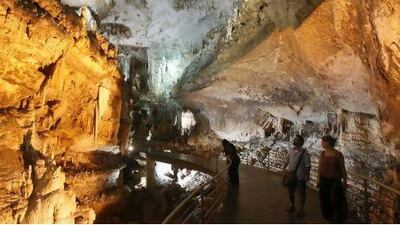JEITA, LEBANON // An ancient limestone cave system is bringing together some of Lebanon's disparate political figures and a slew of celebrities in a bid to have Jeita Grotto named as one of the New Seven Wonders of Nature.
Voting in the global competition, with 28 finalists, is entering its last phase with the winners to be announced on Friday.
The campaign in Lebanon is in full swing with advertisements and SMS prompts, Facebook and Twitter requests, and YouTube videos all encouraging people to vote. Support has come from the country's president, Michel Sleiman, the singer, Ragheb Alama, and Miss Lebanon Yara Khoury-Mikhael.
Even Hizbollah's leader, Hassan Nasrallah, added his voice to the high-profile endorsements, describing the caves as "really one of the wonders of the world" during a recent television interview.
Nejib Miqati, Lebanon's prime minister, described voting for Jeita as a "national duty" - much to the umbrage of some who have said their country has more pressing matters to unite around than international recognition of a network of caves.
Jeita Grotto, an almost 10-kilometre cave system, was discovered in 1836 when an American clergyman stumbled upon the lower chamber. The discovery led to further exploration and the opening of sections of the site to visitors by the late 1950s.
After the country's 15-year civil war, parts of the grotto's infrastructure lay in ruins. In 1993, three years after the end of the war, the government brought in Nabil Haddad, a Lebanese-German engineer, to head a multimillion dollar project to rehabilitate and manage the site.
Tucked into verdant hills 20 kilometres from Beirut, Jeita is now one of Lebanon's main tourist attractions. Inside the cathedral-like chambers, specially designed lights illuminate stalactites - including the world's largest. In the lower grotto, boats take visitors through the water-filled cave, past sparkling, otherworldly rock formations.
Supporters of the grotto's bid refer to the vastness of the chambers, as well as the wealth of geological treasures inside the caves.
Mr Haddad and his team began a campaign to nominate Jeita Grotto for the New Seven Wonders of Nature competition back in 2008.
At first, he said, no one took the bid seriously. But gradually as they reached out to schools, universities, municipalities, government bodies and the Lebanese diaspora, momentum started to build.
Mr Haddad, the head of Lebanon's official supporting committee, said there has already been a "big result" from the campaign, regardless of whether Jeita wins or not.
"People have been taught a lesson about respecting nature," said the 64-year-old. "Also, it's a nice idea for people to hear about Lebanon [when it's] not about war, but about something unique."
The New Seven Wonders of Nature is a competition run by New7Wonders, a Swiss-registered foundation and commercial enterprise. Also among the finalists are the UAE's Bu Tinah archipelago, the Galapagos Islands in Ecuador and Australia's Uluru, an iconic sandstone formation formerly known as Ayers Rock.
But the campaign in Lebanon has also faced criticism.
Some have complained that the effort, time and money spent on the bid, in a country grappling with pressing issues such as massive public debt, a turbulent political environment, daily power cuts, poor public transport and one of the slowest internet connections in the world.
Still, Mr Haddad said that the campaign had generated some respect for Lebanon's environment and showcased one of its natural treasures.
"It's nice if you see the emotion of patriotism in Lebanese in a positive way, not in a bad way," he said. "To see people go hand in hand to make something good."
zconstantine@thenational.ae

